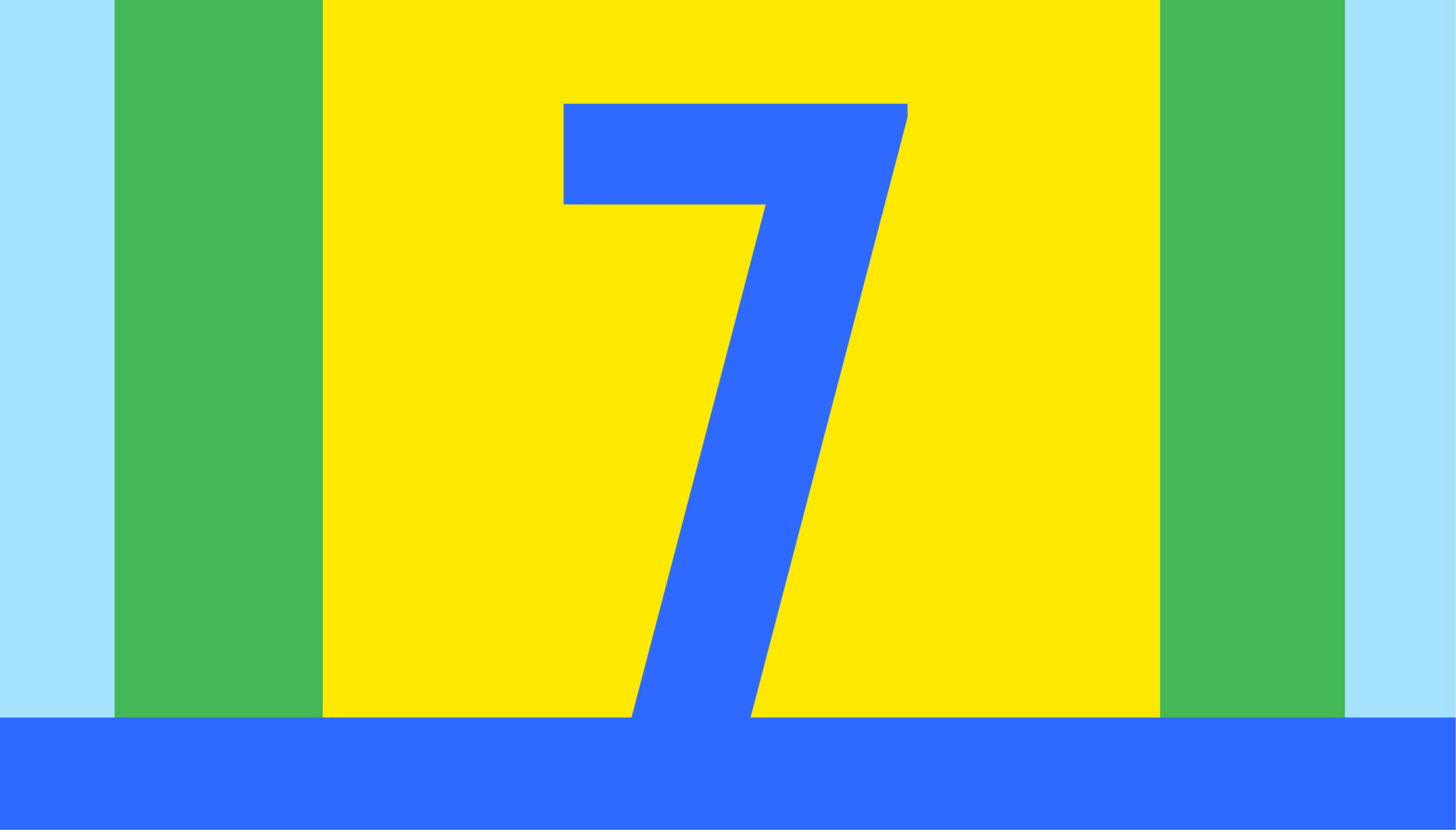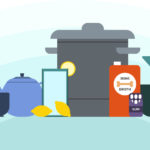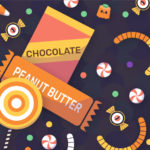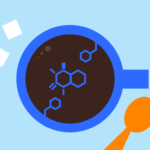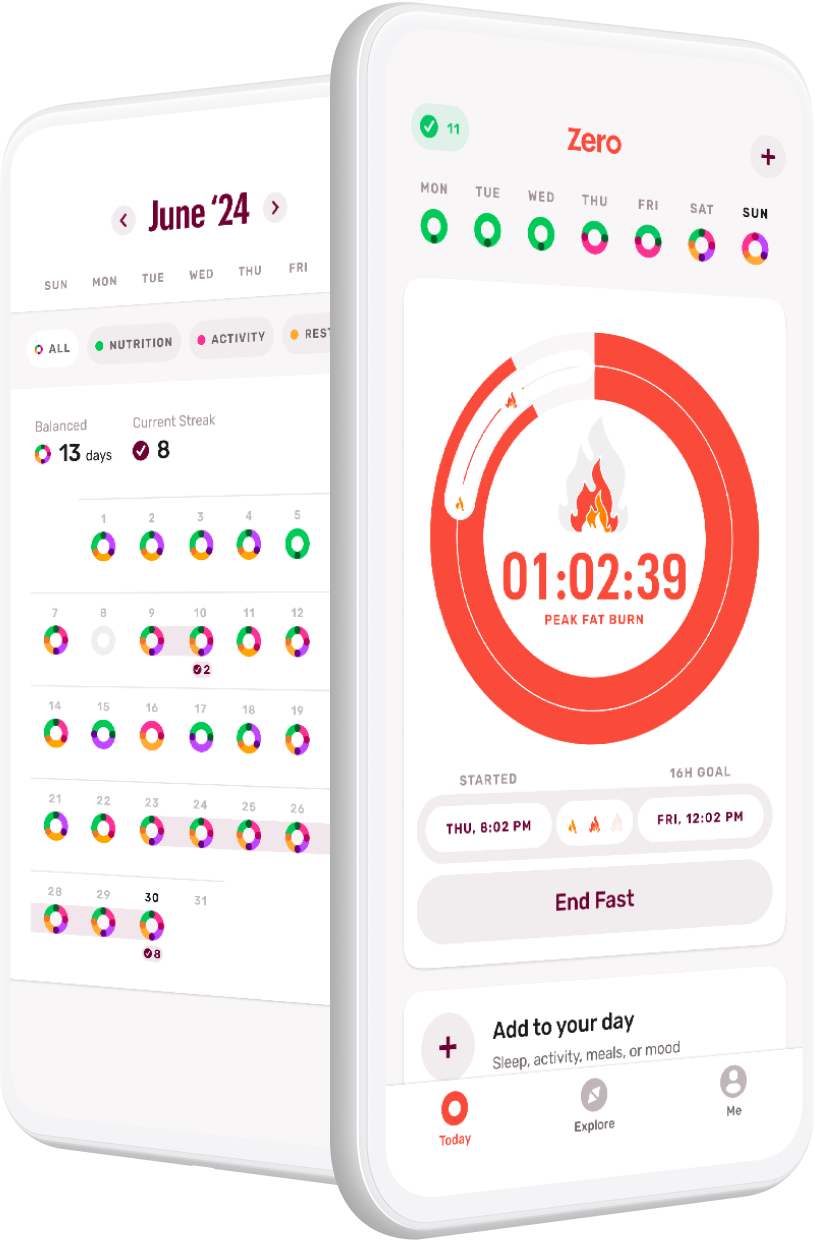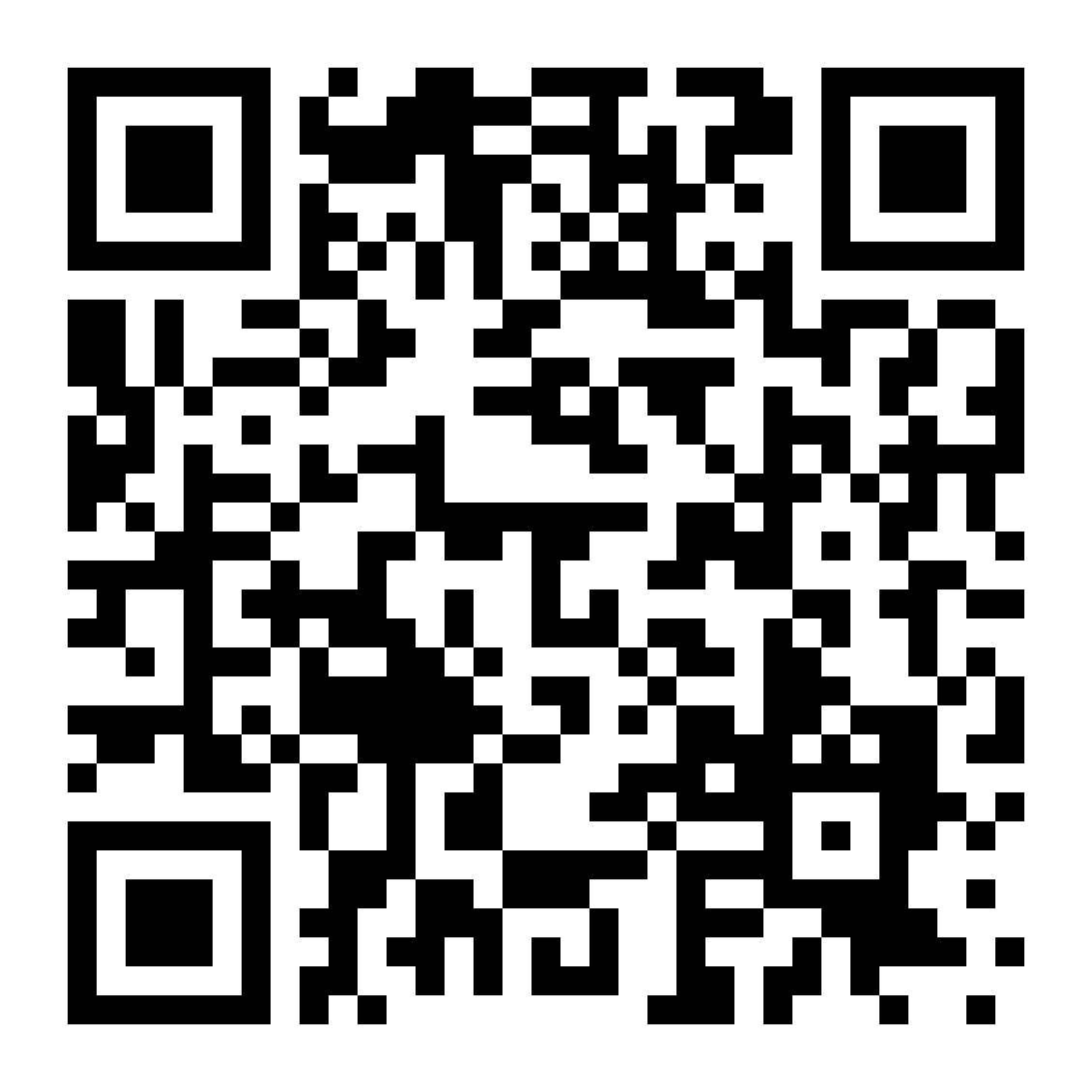Written and medically reviewed by Rich LaFountain, PhD
Whether you’re brand new to fasting or a seasoned veteran, you’ll likely run into questions over whether a certain food or drink is fast-friendly. Can you put butter in your coffee? In fact, can you drink coffee at all?
The answer depends on what you’re trying to achieve with your fast. In this article, we cover seven foods and beverages and reveal whether or not eating or drinking them — while on a fast! — will interfere with your fasting goals.
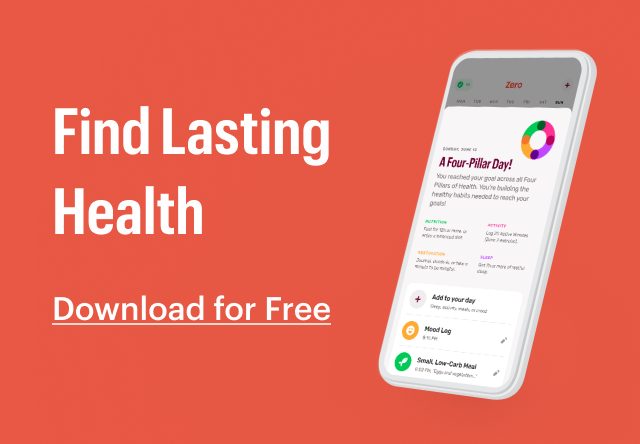
What You Can Eat (and Drink) Depends On Your Goals
When it comes to deciding what you can and can’t consume on a fast, you need to first know what your goal is. Why are you fasting? With that answer in hand, you can then ask, “Will eating or drinking X disrupt progress towards my goal?”
Common fasting goals can generally be grouped into 1) autophagy/gut rest and 2) weight loss/metabolic health.
If Your Fasting Goal Is Autophagy or Gut Rest…
Autophagy and gut rest fasts prohibit any caloric substances from passing your lips. Even one or two calories can be enough to stop autophagy and rouse your gut out of its fasted resting state. This means that virtually all foods, beverages, powders, pills, and even breath mints and gum chewing are off limits. During these fasts, you’re pretty much confined to unflavored water (sparkling is OK) and unsweetened herbal tea. That’s right: No coffee allowed! And certainly no coffee with butter.
If Your Fasting Goal Is Weight Loss or Metabolic Health…
Weight loss and metabolic health fasts, on the other hand, allow you some “non-insulinogenic” options. The goal of these fasts is to drive down glucose and insulin levels in your blood so your body can turn on fat burning — also known as “flipping the metabolic switch.” In this case, your food and beverage options are a bit broader, since small amounts of calories and foods primarily composed of fat are less inclined to shut down the favorable metabolic processes you want activated during your fast.
Consequently, the following seven items apply almost exclusively to individuals who are pursuing weight loss and metabolic health. (See #3 and #4 for exceptions.)
7 Foods and Beverages That Won’t Break Your Fast
#1. Fats and Oils
For most people, foods including butter, ghee, cream, olive oil, coconut oil, and MCT oil are unlikely to break your fast as long as the serving size stays small — ideally one tablespoon or less. This is why some people add healthy fat to their morning cup of coffee: Coffee contains just 1–2 calories in an entire cup, and that little bit of fat helps you hit your fast duration target reliably while also facilitating fat burning. The same logic can be useful if you’re extending your normal fasting window — adding some fats may help you reach your goal. Keep in mind, however, that fats and oils are calorically dense, so although they are unlikely to spike insulin (and thereby crush your fat-burning metabolic health goal), they have the potential to hamper weight loss.
#2. Herbs and Spices
Most dried herbs and spices are light on calories, so a small amount (one teaspoon or less) during your fast is fine. In fact, certain ones may even be beneficial. Cinnamon, dill, lemongrass, cardamom, and nutmeg can naturally reduce blood-glucose levels, making them excellent additions to fast-friendly foods and beverages. However, some herbs and spices raise insulin levels, so try to steer clear of black pepper, caraway, fennel, fenugreek, ginger, lemon balm, oregano, parsley, rosemary, saffron, and sage during your fasts.
#3. Water, Mineral Water, and Sparkling Water
Regular filtered, flat, and tap water is A-OK during any type of fast. In fact, it’s essential! Drinking ample amounts of water can help you avoid dehydration, reduce hunger, and enhance metabolic function. Some studies suggest that enhancing water with minerals or flavoring will help you drink more and stay better hydrated, while fizzy, bubbly, and sparkling water has some additional appetite-suppressing effects, all of which can aid your fast. Just be sure to avoid flavored water and sparkling waters that include sugar, which will raise insulin levels and break your fast.
#4. Tea
As long as you refrain from adding sugar, honey, or milk, tea will not break your fast. Green tea in particular is higher in polyphenols than most other teas and may actually enhance your body’s autophagy processes — so yes, you can drink green tea on an autophagy fast! However, the caffeine in green tea breaks a gut-rest fast, so if that’s your goal, choose peppermint or ginger tea instead.
#5. Coffee
Black coffee has almost no calories and, similar to tea, it contains polyphenols that improve health and glucose handling. Some known health benefits of regular coffee drinking include prevention of type-2 diabetes and lower body-fat mass. Some researchers even claim that certain micronutrients in coffee are vital to human health!
If you can’t stomach your coffee black, you can add a small amount (one tablespoon or less) of dietary fat, like butter, heavy cream, coconut oil, or MCT oil. However, you’ll want to avoid other types of dairy and non-dairy milks and creamers, which contain carbohydrates that can push your glucose and insulin levels high enough to break your fast. (Remember: Lactose is a sugar!)
#6. Apple Cider Vinegar
Apple cider vinegar (ACV) is another calorie-free flavoring that comes with added health benefits. Long before it was popularized as a biohack, ACV was used to help keep glucose levels in a healthy range for patients with diabetes. Research indicates that 1–2 tablespoons of vinegar can reduce a blood sugar spike by 25–35%. It works by blocking enzyme activity in your saliva so that the glucose in food, which would normally start breaking down in your mouth, breaks down more slowly in your gut, leading to a smaller glucose peak. Therefore, the best time to have ACV (ideally diluted into water to protect your teeth from the acidity!) is at the end of your fast, just before you eat your Fast Breaker.
#7. Lemon Juice
Lemon juice, like ACV, has a dampening effect on blood glucose. While the fruit sugar known as fructose makes lemon juice caloric, fructose has a very low glycemic index. Therefore, as long as you don’t add too much lemon juice to your water, your weight- loss or metabolic-health fast will remain intact.
Bonus: 7 More (Non-Food) Things That Won’t Break Your Fast
#1. Caffeine
Caffeine in powder or capsule form is slightly different from naturally occurring caffeine in coffee or tea. According to the literature, a moderate <250 mg dose of a caffeine supplement (equaling about three cups of coffee) has no significant effects on glucose or insulin levels. However, at higher dosages, the caffeine can increase both glucose and insulin, which may break your fast.
#2. Minerals & Electrolytes
Without added sugar, sweeteners, or flavorings, minerals and electrolytes will not break your fast — and they may be important to add! Fasting can reduce electrolyte levels in your body, making you feel sluggish or even light-headed. To prevent these symptoms, consider supplementing with sodium, magnesium, and potassium. Sodium is the easiest: Just add a pinch of table salt or himalayan sea salt to your beverage. Salt blends containing sodium and potassium are a great option, too. Finally, flavored sugar-free electrolyte supplements that contain only a few calories will fit within your fast and can even encourage you to drink more, helping you stay properly hydrated.
#3. Non-Sugar Sweeteners
Whether a non-sugar sweetener is natural (found in nature) or artificial (synthesized by humans), research indicates that it will break your autophagy or gut-rest fast. This is because the sweet flavor stimulates your taste buds, which tells your brain food is on the way and activates your digestive system. However, natural non-caloric sweeteners like stevia or monk fruit contain zero calories and will not spike your glucose or insulin; therefore, they’re fine to consume while fasting for weight loss or metabolic health.
#4. Creatine
Creatine does not contain any calories and has been shown to have no effect on insulin, so it won’t break your fast. However, research suggests creatinine can turn on cellular growth pathways and is better absorbed with food, so it’s probably best to wait until you break your fast to supplement with creatine.
#5. Probiotics & Prebiotics
Probiotics — which people take to maintain gut microbiome diversity (and thereby improve health and reduce disease risk) — contain very few, if any, calories. However, taking them with food gives the bacteria a better chance of survival while they make their way through the digestive system and gives the bacteria the nutrition necessary to grow and multiply. In fact, many probiotic supplements are now combined with prebiotics, i.e., food for your gut bacteria. Since prebiotics usually contain some calories, it’s best to take all the -biotics within your eating window.
#6. Vitamins
Gummy vitamins might as well be gummy bears when it comes to breaking your fast — nearly all of them contain sugar and are therefore off-limits while you’re fasting. However, most other vitamin tablets and pills are non-caloric and fast-friendly. But be forewarned: Some can make you feel ill and/or are not well absorbed when taken on an empty stomach. This is often the case with fat-soluble vitamins including vitamins A, D, E, and K.
#7. Medications
Most over-the-counter medications that come in pill form, including pain relievers, cough and cold medicine, and allergy medications, do not contain calories and will not break your fast. Medications that come in the form of gummies, syrups, drinks, and lozenges, on the other hand, will usually contain sugar or another caloric sweetener that will interfere with your fast.
Conclusion
The most important part in determining whether or not something you eat or drink will break your fast is establishing your reason for fasting. If you are focused on weight loss and metabolic health, you can get away with consuming a few calories during your fast, as long as they don’t spike blood glucose and insulin. If you want to rest your gut and/or turn on your body’s autophagy processes, you have to be much more stringent with what you consume.
There are obviously many more foods, beverages, and supplements than the fourteen covered in this article, so if you’re unsure if something breaks your fast, consult this checklist and/or check out Zero Longevity on Instagram and TikTok, where we regularly share tips on what does (and does not) break a fast.
- Debunking 3 Myths Around Fasting and Thyroid Health - April 15, 2024
- Breaking Down Fast Breakers: How to Tell If Something Will Break Your Fast - March 4, 2024
- GLP-1s and Weight-Loss Medications vs. Lifestyle Interventions: What’s Right for You - February 5, 2024
